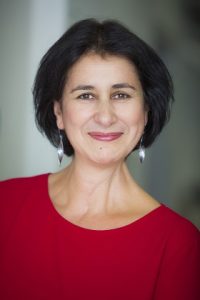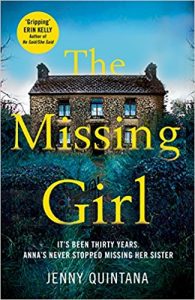Finding the Confidence to Write The Missing Girl

Jenny Quintana, author.
I’ve wanted to be an author for as long as I can remember. I grew up in Essex and Berkshire, the youngest of five children and an only girl. I was quiet and shy and spent most of my time reading and writing stories. My parents encouraged me with trips to libraries and bookshops. Most importantly, they believed that one day I would be a writer.
As a child, I took every opportunity to write: sending letters and short stories to newspapers, creating comics which I sold to my parents, writing stories for my own pleasure and a detective novel inspired by Agatha Christie. But as with many people, as childhood faded, so did my confidence.
Loving books, it was natural that I would choose to study English Literature at university, and then I became an English teacher in East London. There were many aspects that I loved about my job, especially the creativity of the children, but teaching was all-consuming and there was no time to write. After I left the school in London, I lived in Seville and then in Athens and taught English as a Foreign Language. My lifestyle was more relaxed, but still, I didn’t take the opportunity to write. The confidence wasn’t there.
It was back in Britain, when I had my first child, that I decided to take a long, hard look at how I was going to fulfil my dream. I sat down at my computer and forced myself to get on with it. I wrote short stories and had some success with competitions and literary magazines. As my confidence grew, it soon became clear to me what I was really interested in. My themes were dark and painful, the focus was on ordinary people affected by terrible things and how those people made sense of their lives. I was beginning to find my voice, but I still had a very long way to go.
I pressed on, starting several novels which I failed to complete, writing two complete novels which failed to sell. I was in danger of giving up for good, but I’d had so many near misses and I wanted it so much, it didn’t seem an option to stop. I realized that if I was going to achieve this, I had to think again.
So I took a step back and focused on what I really wanted to write about. I began with my characters. Who were they? What was their story? The characters came to me – two sisters with very different personalities, but with an incredibly close bond. The younger one, Anna, was thoughtful and sensitive and idolized the beautiful and popular, Gabriella. I imagined what they would look like, what would be their strengths and their flaws. I put them in the context of their family and the village where they lived. I began to imagine them as real people. I knew too, that Anna would be my protagonist, that she would face something terrible in her life which she would have to deal with forever.
I had the characters, but what about the story? What could be the most emotional, traumatic thing that could happen to Anna? Because I’m interested in real events that happen to real people, my inspiration comes from stories in the news. I considered tragic cases about children and teenagers who vanish inexplicably from their family’s lives, not only because they are taken or because they run away, but through death, through illness or accident or deliberate acts of violence.
Often the focus is on the parents, but what must it be like for the remaining siblings? How must it affect them forever? How can they make sense of that awful void in their lives? And how could I tell this story when there should be so much emphasis on Anna coping as an adult? I made the decision to write the novel as two strands: in the past, in 1982, and in the present, thirty years later. That way I could explore Anna’s character both as a child and as an adult.
And so I began and as I wrote, I strived to fulfil two things: to write a compelling mystery that would make the reader want to turn the pages, but also to tell a story that explored the terrible circumstances that Anna has to deal with when Gabriella disappears, how she makes sense of it, if indeed she can.
Even with these ideas firmly planted in my head, it took me another two years to get there. Despite sometimes losing faith, I pressed on every day, writing as many words as I could fit in around my job and my children. To inspire myself further and to keep on track, I took a writing course in London where I worked on the novel and shared ideas with my fellow students. The novel changed quite a bit in terms of plot, but the idea and the central characters remained the same.
It took many years to write this book and to finally be published. Strangely, though, when I look back, I realize that the characters were always there, lurking in my scribblings and my stories, waiting for the time when I would find the confidence to do them justice and write their story properly in the novel that became The Missing Girl.
—
Jenny Quintana grew up in Essex and Berkshire, before studying English Literature in London. She has taught in London, Seville and Athens and has also written books for teaching as a foreign language. She is a graduate of the Curtis Brown Creative writing course and lives with her family in Berkshire. Jenny has four brothers and no sister but she is fascinated by the relationships between sisters.
Twitter: @jennyquintana95
About THE MISSING GIRL
 A stunning debut thriller, The Missing Girl by Jenny Quintana is a gripping novel full of twists and turns, and a desperate hunt to solve a decades-old mystery.
A stunning debut thriller, The Missing Girl by Jenny Quintana is a gripping novel full of twists and turns, and a desperate hunt to solve a decades-old mystery.
Anna Flores was just a child when her adored teenage sister disappeared.
Unable to deal with the pain, Anna took the first opportunity she had to run from her fractured family, eventually building a life for herself abroad.
Now, thirty years on, her mother has died, and Anna must return home to sort through her possessions.
In doing so, she has to confront the huge hole her sister’s disappearance left in their lives, leaving just one question unanswered: what really happened to Gabriella?
Because not knowing is worse than the truth.
Isn’t it?
Category: On Writing
























